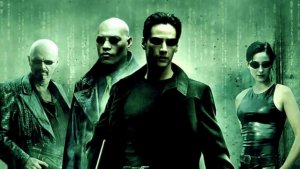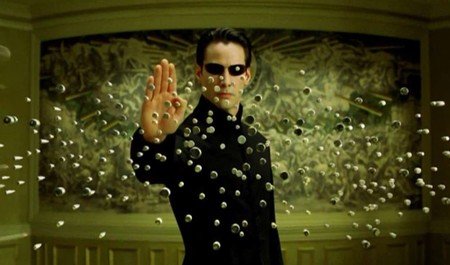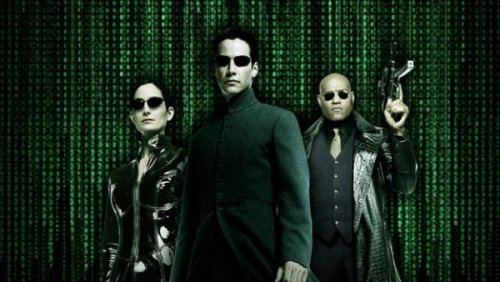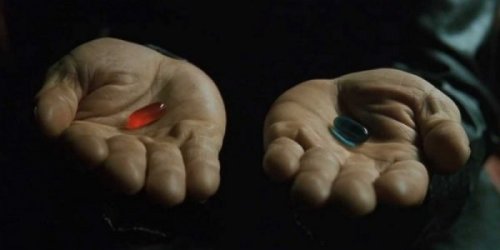The Matrix: Questioning Reality

“What is the Matrix?” is the question that Neo, the main character of this film, often asks himself. In all honesty, when people watch The Matrix for the first time, they also ask themselves this. This movie trilogy is well-known nowadays. There have been countless analyses of these films and, in fact, teachers often use them to complement their philosophy classes.
In this article, we’re going to be talking about the first movie. This might be the most significant and curious one. It’s very difficult to summarize in a single article every analysis-worthy aspect of this film. Because of that, we’ll simply focus on making a global analysis of some of the things people usually feel after watching the film.
How can we know if we’re awake? What is real? What isn’t real? I’m sure that, if you’ve ever watched this film, you’ve asked yourself this at least once. It’s possible that you had done it even before watching The Matrix. Many of us have had the sensation of not being able to act on our own free will. Some of us have thought that our actions are predetermined or very influenced or that we live in a very Nietzsche-like world. Sometimes, we might even think we’re being manipulated and controlled and that we might be inside a dream. The Matrix gives an answer to all of these questions. It’s kind of like a contemporary myth, a solution to some of the dilemmas of humanity.

The technological advances that came up ended up enslaving us. Those machines that keep on getting more and more intelligent have acquired a willpower of their own. They’ve reached and exceeded human intelligence. However, resources have become scarce and these machines need to be fed. That way, after a war, machines will end up enslaving human beings, turning them into food sources. Humans are forced to live a dream; to sleep for a lifetime while being connected to machines that feed on them.
This is a dystopian and terrifying future that’s becoming less absurd each day. Some humans have managed to resist and live in Sion, the only free city to which they access the Matrix with the intention of releasing more humans and starting a fight to get out of slavery. A very science-fiction kind of discourse, but that’s also full of criticism and power. It has the ability to make us question our own reality. How do I know if I’m not living in a dream? Am I the owner of my decisions?
What is The Matrix?
The first thing we’ll try to do is explain what the Matrix is. Morfeo himself is the one who answers this. He says, “It’s the world that’s been placed before your eyes to hide the truth from you.” What this means is that the Matrix is a lie to our senses: it’s not real but we perceive it as real.
Plato said that our senses were deceptive and not reliable. If you don’t remember what this myth is about, it basically talks about humans whose feet and hands are tied and observe the bottom of a cave. Behind them, a lit fire projects shadows in the background, which they contemplate. For these humans, the background is their reality because it’s the only thing they know. It’s the only thing they have access to and the only thing their senses perceive.
If one of these humans got to escape, they’d have access to the real world, to knowledge. At first, the light would blind their eyes, they’d feel pain and would have to adapt. When they returned to the cave, their friends would probably think they’re lying and would try to kill him. Those friends only know one reality and, as a consequence, they’ll try to protect it no matter what.
This is something that reminds us of old times like Galileo or Copernicus. In Matrix, Neo has a suspicion, an idea he can’t get out of his mind. Just like in Alice in Wonderland, Neo follows a rabbit that’ll take him down the burrow. However, this time, Neo won’t be accessing a fantastic, unreal place; instead, he’ll be accessing the real world, the world of the ideas that Plato proposed.

The interesting thing about The Matrix is the way it gives a response to reality. It takes mundane things like a déjà-vu and gives them a sense and adapts it to the proposed system. The Matrix is a kind of virtual reality where we’re all asleep and which we live as if it were real. Isn’t it true that, when we wear virtual reality glasses, despite knowing it isn’t real, our senses interpret it as such? That’s precisely what happens in The Matrix. We perceive sensations as real and, consequently, we stop questioning whether we’re awake or not.
On the other hand, the questions that Neo asks about his reality reminds us of Descartes. He solved the problem by talking about an evil genius who manipulated and deceived us, just like the machines in the Matrix do. Descartes doubts everything and the Matrix makes us doubt our senses.
Also, all of this makes reference to Hilary Putnam. She talked about something similar to the evil genius. How can we know we’re not brains in buckets? How can we know we’re not living in a shared dream? These questions that Putnam raised could also be seen in The Matrix. It’s like a situation everyone shares without noticing the nature of what we’re living.
Are we free?
If we live in a shared dream, meaning that the dream isn’t even ours, we must ask ourselves if fate really exists and if our actions are actually ours. One of the most interesting characters related to this is Oracle. He’s the one to tell Neo that he’s able to decide, that he’s the only owner of the decisions he makes. It’s curious because the character of Oracle associates with fate. The film is constantly based on decisions: red or blue pill, knowing the truth or not. Some have also related this freedom of choice to Sartre’s existentialism.

If fate doesn’t exist and nothing’s already been decided, then we’re the ones who create our own destiny with our decisions. However, the movie also shows the possibility of a destiny, of something that was already determined. But at the same time, it shows arguments that contradict it. At that point, Oracle is one of the most important characters, as well as Morpheus, whose position doesn’t negate any of the previous hypotheses. Morpheus believes in destiny, but he also believes in the power of decision.
The Matrix also raises the issue of knowledge and happiness. We see that the real world they access when they leave the simulation is not a good one. They discover a terrifying truth and become immersed in a world of shadows. At that point, it’s valid to ask ourselves if knowledge is actually good and if it really leads to happiness. A lot of us see happiness as the ultimate goal.
Cifra is the repentant character of the film. He wished to access the truth and, when he finally got to it, he decided to go back to the unreal world. He wanted fantasy back and to just ignore reality. Cifra decided that he prefers to live an ignorant life than knowing the truth.
The amount of philosophical questions that The Matrix raises is really interesting. It makes us become temporary judges and observers. In addition, it makes us question our own decisions, happiness, and the world that surrounds us. Undoubtedly, The Matrix is a film that professors should show in philosophy classrooms since it pretends to answer certain philosophical threads without prejudice. It allows us to open our minds and question everything.
“What is real? How do you define real? If you’re talking about what you can feel, what you can smell, what you can taste and see, then real is simply electrical signals interpreted by your brain.”
-Morpheus, The Matrix–
“What is the Matrix?” is the question that Neo, the main character of this film, often asks himself. In all honesty, when people watch The Matrix for the first time, they also ask themselves this. This movie trilogy is well-known nowadays. There have been countless analyses of these films and, in fact, teachers often use them to complement their philosophy classes.
In this article, we’re going to be talking about the first movie. This might be the most significant and curious one. It’s very difficult to summarize in a single article every analysis-worthy aspect of this film. Because of that, we’ll simply focus on making a global analysis of some of the things people usually feel after watching the film.
How can we know if we’re awake? What is real? What isn’t real? I’m sure that, if you’ve ever watched this film, you’ve asked yourself this at least once. It’s possible that you had done it even before watching The Matrix. Many of us have had the sensation of not being able to act on our own free will. Some of us have thought that our actions are predetermined or very influenced or that we live in a very Nietzsche-like world. Sometimes, we might even think we’re being manipulated and controlled and that we might be inside a dream. The Matrix gives an answer to all of these questions. It’s kind of like a contemporary myth, a solution to some of the dilemmas of humanity.

The technological advances that came up ended up enslaving us. Those machines that keep on getting more and more intelligent have acquired a willpower of their own. They’ve reached and exceeded human intelligence. However, resources have become scarce and these machines need to be fed. That way, after a war, machines will end up enslaving human beings, turning them into food sources. Humans are forced to live a dream; to sleep for a lifetime while being connected to machines that feed on them.
This is a dystopian and terrifying future that’s becoming less absurd each day. Some humans have managed to resist and live in Sion, the only free city to which they access the Matrix with the intention of releasing more humans and starting a fight to get out of slavery. A very science-fiction kind of discourse, but that’s also full of criticism and power. It has the ability to make us question our own reality. How do I know if I’m not living in a dream? Am I the owner of my decisions?
What is The Matrix?
The first thing we’ll try to do is explain what the Matrix is. Morfeo himself is the one who answers this. He says, “It’s the world that’s been placed before your eyes to hide the truth from you.” What this means is that the Matrix is a lie to our senses: it’s not real but we perceive it as real.
Plato said that our senses were deceptive and not reliable. If you don’t remember what this myth is about, it basically talks about humans whose feet and hands are tied and observe the bottom of a cave. Behind them, a lit fire projects shadows in the background, which they contemplate. For these humans, the background is their reality because it’s the only thing they know. It’s the only thing they have access to and the only thing their senses perceive.
If one of these humans got to escape, they’d have access to the real world, to knowledge. At first, the light would blind their eyes, they’d feel pain and would have to adapt. When they returned to the cave, their friends would probably think they’re lying and would try to kill him. Those friends only know one reality and, as a consequence, they’ll try to protect it no matter what.
This is something that reminds us of old times like Galileo or Copernicus. In Matrix, Neo has a suspicion, an idea he can’t get out of his mind. Just like in Alice in Wonderland, Neo follows a rabbit that’ll take him down the burrow. However, this time, Neo won’t be accessing a fantastic, unreal place; instead, he’ll be accessing the real world, the world of the ideas that Plato proposed.

The interesting thing about The Matrix is the way it gives a response to reality. It takes mundane things like a déjà-vu and gives them a sense and adapts it to the proposed system. The Matrix is a kind of virtual reality where we’re all asleep and which we live as if it were real. Isn’t it true that, when we wear virtual reality glasses, despite knowing it isn’t real, our senses interpret it as such? That’s precisely what happens in The Matrix. We perceive sensations as real and, consequently, we stop questioning whether we’re awake or not.
On the other hand, the questions that Neo asks about his reality reminds us of Descartes. He solved the problem by talking about an evil genius who manipulated and deceived us, just like the machines in the Matrix do. Descartes doubts everything and the Matrix makes us doubt our senses.
Also, all of this makes reference to Hilary Putnam. She talked about something similar to the evil genius. How can we know we’re not brains in buckets? How can we know we’re not living in a shared dream? These questions that Putnam raised could also be seen in The Matrix. It’s like a situation everyone shares without noticing the nature of what we’re living.
Are we free?
If we live in a shared dream, meaning that the dream isn’t even ours, we must ask ourselves if fate really exists and if our actions are actually ours. One of the most interesting characters related to this is Oracle. He’s the one to tell Neo that he’s able to decide, that he’s the only owner of the decisions he makes. It’s curious because the character of Oracle associates with fate. The film is constantly based on decisions: red or blue pill, knowing the truth or not. Some have also related this freedom of choice to Sartre’s existentialism.

If fate doesn’t exist and nothing’s already been decided, then we’re the ones who create our own destiny with our decisions. However, the movie also shows the possibility of a destiny, of something that was already determined. But at the same time, it shows arguments that contradict it. At that point, Oracle is one of the most important characters, as well as Morpheus, whose position doesn’t negate any of the previous hypotheses. Morpheus believes in destiny, but he also believes in the power of decision.
The Matrix also raises the issue of knowledge and happiness. We see that the real world they access when they leave the simulation is not a good one. They discover a terrifying truth and become immersed in a world of shadows. At that point, it’s valid to ask ourselves if knowledge is actually good and if it really leads to happiness. A lot of us see happiness as the ultimate goal.
Cifra is the repentant character of the film. He wished to access the truth and, when he finally got to it, he decided to go back to the unreal world. He wanted fantasy back and to just ignore reality. Cifra decided that he prefers to live an ignorant life than knowing the truth.
The amount of philosophical questions that The Matrix raises is really interesting. It makes us become temporary judges and observers. In addition, it makes us question our own decisions, happiness, and the world that surrounds us. Undoubtedly, The Matrix is a film that professors should show in philosophy classrooms since it pretends to answer certain philosophical threads without prejudice. It allows us to open our minds and question everything.
“What is real? How do you define real? If you’re talking about what you can feel, what you can smell, what you can taste and see, then real is simply electrical signals interpreted by your brain.”
-Morpheus, The Matrix–
This text is provided for informational purposes only and does not replace consultation with a professional. If in doubt, consult your specialist.







